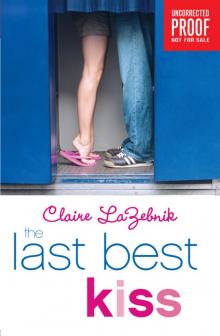- Home
- Claire Lazebnik
The Trouble With Flirting
The Trouble With Flirting Read online
Dedication
For Johnny, who taught me everything I know about summer acting programs and who makes me laugh more than anyone else in the world.
Contents
Dedication
Act I
Scene One
Scene Two
Scene Three
Scene Four
Scene Five
Scene Six
Act II
Scene One
Scene Two
Scene Three
Scene Four
Scene Five
Act III
Scene One
Scene Two
Scene Three
Scene Four
Scene Five
Scene Six
Excerpt from Epic Fail
One
Two
About the Author
Back Ads
Other Books
Copyright
About the Publisher
act I
scene one
When Jasper Snowden’s parents divorced, Jasper got to stay in his bedroom in the big house he’d always lived in, while his parents took turns living there with him. They said they didn’t want him to have to bounce around from one bed to another. To make the arrangement work smoothly, Mr. Snowden (who, my mother said, “is in real estate—and that’s where the real money is, you know”) bought two other houses in the same neighborhood, one for him and one for his ex-wife.
That’s how the rich get divorced, I guess: they just stash every member of the family in his or her own comfortable home. If the Snowdens had had a dog, he’d probably have gotten his own little dog-sized house with a lovely view of the fire station.
Yeah, my parents’ divorce was a little different from that.
Mom and William and I stayed in the three-bedroom apartment we’d been living in for the past five years, and my dad got a one-room studio in a building about twenty minutes away. “It’s ugly and it looks out on a parking lot, but at least it’s small” is his big joke about it. The one he’s repeated every time I’ve come over.
He feels bad there’s no real guest bed at his place, and has told William and me we can have the futon whenever we want and he’ll sleep on the floor. But that just seems weird, so we never sleep over.
Whenever he feels glum about our housing situation, Dad cheers himself up by reminding us all that at least he’s close to us and both apartments are in the same good school district.
But sometimes I wonder if going to school in a wealthy neighborhood is such a great thing for us anyway. No one’s about to ostracize us because we’re not rich, but there are times when it’s just awkward. Like when you all go out to dinner and everyone’s going to split the check, but you have to point out that all you got was some soup because you can’t afford to chip in for everyone else’s thirty-dollar entrées. Or when the kids at lunch are all comparing what they got for Christmas that year and you can only really listen, because what are you going to say? I got three new books and a shirt? William and I have this shorthand where he’ll say to me something like Clayton Walstaff got a vintage Gibson guitar for Christmas, and I’ll say something like Yeah, well, Georgia Olstead got a BMW, and then we just laugh because it’s all so ridiculous.
And then there’s the whole what are you doing this summer? conversation, which starts early in the spring, and this year—my junior year—is more intense than ever before, because everyone knows this is the summer to do something to impress colleges. And impressive summers don’t come cheap.
A lot of money can buy you a “community service” trip, like the one my friend Kiana is going on: she’ll travel to Costa Rica, where she’ll carry water or something for the first week and then party with other Americans at a beach resort for another week. She’s already decided that her college essay is going to be about how great it is to “help our brothers and sisters in our global village.” She’s just waiting to plug in some firsthand specifics.
Money can also buy you a summer term at Oxford or some other fantastic European university. My friend Chloe is going to the Sorbonne, where she’ll sit in on fiction classes during the day and hang out in Paris at night. Her college essay? Probably something like “how I stopped being a tourist and became a citizen of the world.”
Wait—maybe I’m wrong. An impressive summer isn’t necessarily all about money.
Sometimes it’s about connections.
Zelda Moreno’s mom knows a doctor who’s taking Zelda in as a research assistant (“I spent my summer curing cancer!”), and Drew Desanti’s dad got him a gig in an architecture firm (“building a better, greener future”), and Natalie Nowak’s uncle Joe got her an internship with a magazine-editor friend of his (“the written word can change the world”).
My parents may not have money, but at least they don’t have any connections, either. (Sorry. I inherited Dad’s sense of humor.)
Not that it matters. I can’t apply for any cool unpaid internships or traveling programs anyway: I have to earn money this summer for college. My mother made that clear long ago. She also said, “Jobs teach discipline and the value of hard work and the importance of not taking anything for granted. And that’s the gift I’m giving to you.”
“I’d rather have a laptop,” I said.
“A job can get you one of those, too. And don’t be a wiseass, Franny.”
William is no help at all. He started working the summer he was fourteen, walking people’s dogs and washing cars, and then, when he was older, scooping ice cream and ripping tickets at the movie theater. Now that he’s in college, he’s moved up in the world and is going to be working at an investment bank in New York City (and sharing a sublet with his longtime girlfriend).
If it weren’t for William, I might have been able to wriggle out of a summer job for one more year, but he’s always been one of those good, responsible oldest sons, which means I have to be good too or be forever cast as the family screwup.
Also? I really do need a new laptop. The one I’m currently using is a hand-me-down from Dad, and he bought it more than five years ago. Do you know what five years is in the laptop universe? Like a hundred human years.
“I don’t want to scoop ice cream all summer long,” I said to Mom as we discussed my job prospects at the kitchen table.
“Don’t worry—it’s not an option anyway. I walked by there last night and they’re fully staffed for the summer already. The Shoe Zone is hiring, though.”
I shuddered. “Great. I can touch people’s feet all summer. And here I was envying Sarah Gabrielle because she’s going on an African safari.”
“Sarah Gabrielle’s mother has a nanny for each kid so she never has to interact with any of them, and she sends them far away whenever she can. Is that really what you want? A mother who’d rather not have you around?”
Mom said it jokingly, but I knew she wanted some real reassurance that I didn’t feel like I was having a deprived childhood. My mom is tough about rules, but deep down she’s a big pile of insecure mush who needs her kids to tell her that, in spite of getting a divorce and having to say no to us about almost everything due to lack of funds, she’s done right by us. Which I guess she has.
So I swallowed the sarcastic comment I was tempted to make and instead squeezed her shoulder and said lightly, “Nah, I’ll take the interfering, overbearing mom I’ve got.”
“And we’ll both keep thinking about the summer,” she said, patting my hand. “We’ll find you something good.”
Remember how I said my parents have no connections? That wasn’t entirely accurate. They have no powerful or rich or interesting connections, but they do have relatives out in the workforce, which is how Mom scored me a summer job.
“I found the perfect thing for you!” she told me when she picked me up after school one afternoon in late May. She had come straight from her job teaching English at a middle school that’s two towns over from us.
“The perfect thing?” I repeated as I closed my car door.
“The job,” she said impatiently. “The summer job. And you’re going to love it.”
“Really? What is it?” I’d been looking but hadn’t had any luck yet. There were too many out-of-work adults who were willing to take anything that paid, and a lot of college students had already come back home for the summer and were also looking for jobs. So I was mildly excited to hear what she’d been able to find.
I was less excited when she told me. “Sewing costumes?” I repeated dubiously. “With Aunt Amelia?”
“Doesn’t that sound fun? You love the theater!”
“I know,” I said. “And you were the one who said it was a waste of my time, remember?” I acted some in middle school, usually in lead roles, but right before high school Mom and Dad sat me down—presenting a united front even though they were already divorced—and told me that I had to figure out what really mattered to me and focus on that.
Then of course they told me what really mattered to me, which according to them was maintaining a high GPA and pitching for the softball team—two things that could potentially score me a college scholarship. So I stopped acting and focused on schoolwork, which is why my GPA is currently somewhere around 4.1, and on my pitching, which is why my rotator cuff is a mess and I’m not playing any sports at all anymore.
Mom waved her hand dismissively. “I never said theater was a waste of time, exactly, just that it shouldn’t be your biggest priority, since you’re good at so many other things. Anyway, the point is, this is at Mansfield College! Remember? Lucinda’s kid told us the program changed his life, and you said you wanted to apply.”
“Right—and you said I had to work, remember?”
“So this is the best of both worlds: you get to be there and you get to earn money!”
“But I don’t get to act,” I said. “Which is kind of the point of an acting program.”
“You’ll still be in that atmosphere, right? You’ll see all the shows and be around kids your own age.”
“Where would I live?”
“With Aunt Amelia.”
“Bleah.”
She shot me a reproving look. “Aunt Amelia means well.”
“She complains all the time about everything. And if I’m working for her—”
“First of all, it’s only for six weeks.”
“Only!”
“Second of all, she said you can eat meals in the dining hall with the campers or students or whatever they’re called. Doesn’t that sound like fun? But you’ll also be earning a paycheck. Win-win!”
“You already told her I’d do it, didn’t you?” I said.
And that’s how I found out that yes, I was already committed to sewing costumes with my aunt Amelia at the Mansfield College High School Theater Program in a suburb of Portland, Oregon, the summer before my senior year of high school.
What a fascinating college essay I’m going to get out of that. “Changing the world one stitch at a time . . .”
scene two
Aunt Amelia wants me to arrive at Mansfield the day before the enrolled students move in, so she can show me around before things get too crazy. The session begins in late June, so after school ends I have two blissful weeks of sitting around other people’s pools and catching up on all the TV I missed during finals.
My flight from Phoenix to Portland is short, which is too bad. I haven’t flown much on my own—okay, the truth is I’ve never flown on my own; I’ve barely ever flown at all—and I get a little thrill looking out the window when we take off and land and smiling mysteriously at the middle-aged man sitting next to me. I wonder if he thinks I’m cute and is glad he’s sitting next to me and not someone old and fat. We don’t ever talk, other than “excuse me” when our elbows bump, so I never find out.
Amelia greets me at the airport with a brusque kiss on the cheek and a “you’ve gotten tall,” then drives us to the campus, which is very leafy-green and pretty.
I know a lot of kids who are planning to apply to Mansfield College, but it’s too small and low-key for me. Some people want that. I want something a little more exciting if I’m going to be spending four years of my life there. NYU would be perfect—I’m desperate to get in.
Mansfield seems especially sleepy now, with all the students gone for the summer. It’s a total ghost town, but Amelia says unenthusiastically that that will change once the high-school seniors arrive.
She trots me quickly past some buildings. “That’s the dining hall, that’s the dorm, that’s the administrative building; that’s the little forest where I’ve seen some of the students smoking and I expect you to stay away from there. Speaking of which, you’d better not smoke. Or drink. Or do anything even worse. I’ll send you home in a second if I catch you doing anything like that—and don’t think, She wouldn’t really, because I promise you I would.”
The tour ends at the theater building, where Amelia has her workroom. She leads me inside and says it’s time to see how good I am at sewing.
My mom taught me a long time ago. Their mother—hers and Amelia’s—was a professional seamstress, which is why they’re both so good at it. Mom only ever used her skill to make Halloween costumes for me and William. But because Mom thinks it’s important for people to be able to do things for themselves like cook and sew and clean, she’s made sure William and I have all the basics down.
I think I’m competent, but after Amelia tests me with a few seams, she informs me that my hand stitches should be smaller and tighter and that I have a “lead foot” on the machine.
“I’m not surprised,” she adds. “Your mother was like that too—more interested in finishing quickly than in the quality of the work. It’s no wonder she’s not a professional.”
“I don’t think she was ever trying to be one,” I say.
“Well, of course that’s what she says now.”
I decide not to argue the point and glance around the workroom. It’s a small space, with two machines side by side and several windows. It’s super hot, and it’s not even July yet, so I’ve got to figure it’s only going to get hotter over the next five weeks. The one square fan is useless against the flood of sunshine coming in, but Amelia tells me we can’t pull the shades down because she needs the light.
“My eyes,” she says, “aren’t what they used to be,” which is probably true, since there are pairs of reading glasses scattered all over the office, within easy reach no matter where she might be sitting or standing.
“So how does this all work?” I ask, resigning myself to a lot of future sweating. “What costumes will we be making?”
“We have five weeks to design and create costumes for four different casts,” she says with a weird mixture of gloom and pride. “I’ve already spoken to the directors and have some sense of what they’ll be wanting, but we can’t really move forward until the kids are cast and we can measure them, which always takes a few days. Until then we’ll be hunting up sources, checking through the archives, and figuring out fabrics.”
“How many cast members altogether?”
“Forty-eight. Twelve to a play.”
“That’s a lot of costumes,” I say.
Amelia throws her hands up in the air. “It’s an ungodly amount of work! Hundreds of costumes—most cast members play multiple roles—and they all have to be ready by the same time.”
I drop down onto the stool. “And there’s only the two of us?”
“I’ve done it every summer for fifteen years,” she says, tossing her head. “With only one assistant, just like now. It’s never easy, but it always gets done. Just be prepared for a lot of long hours and hard work.”
“Do you make everything from scratch?”
“Not ev
erything. I buy some pieces and use what I can from the school’s archives.”
“Oh,” I say, relieved. “That’s not so bad, then.”
“It’s still bad,” she says. “We’ll have to alter everything. Teenage girls today are either too fat or too thin. There’s no such thing as a normal body anymore.”
“I beg your pardon,” I say with mock indignation.
I’m just joking, but she narrows her eyes at me and tilts her head back so she can survey me over her long, thin nose. “Don’t fish for compliments. You may discover that no one feels like giving you one.”
“I wasn’t,” I say—which, by the way, is true.
“Your body is fine now, but give it twenty, thirty years. Gravity and time do horrible things to a woman. I had your body once.”
“How’d I end up with it, then?” I say jovially.
She just sighs. “Time and gravity get us all in the end,” she says darkly. “Time and gravity.”
Amelia shows me the costume and prop archives under the theater, and then she takes me to her apartment. We drive, since she picked me up at the airport, but she says she usually walks, because her apartment is so close to campus. She works there year-round, running the costume part of the theater department (she also teaches a course on costume design and one on costume history), and rents the place from a building Mansfield owns. It’s in a beautiful, expensive neighborhood—she tells me she couldn’t afford to live there if the college didn’t subsidize it. There are several entryways into her building, and a fenced-off area with a postage-stamp-sized pool and a cheap aboveground hot tub that Amelia tells me she’s sure is a breeding ground for dangerous bacteria.
The actual apartment is small but clean and neat. Her furniture is simple and generic, but every window has some kind of gorgeous curtain on it—all handmade by her, of course—and the sofa and chair pillows are wildly luxurious, covered with tassels, fringe, and buttons, like something out of a harem.
Makes me wonder if somewhere inside Amelia there’s a romantic soul. You certainly wouldn’t know it to look at her in her white oxford shirt and cotton khakis.

 If You Lived Here, You'd Be Home Now
If You Lived Here, You'd Be Home Now The Trouble With Flirting
The Trouble With Flirting Epic Fail
Epic Fail Things I Should Have Known
Things I Should Have Known The Last Best Kiss
The Last Best Kiss Families and Other Nonreturnable Gifts
Families and Other Nonreturnable Gifts The Smart One and the Pretty One
The Smart One and the Pretty One